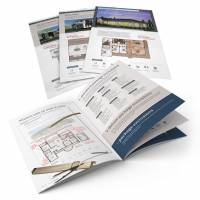Receive your free home designs brochuresRequest Now
How Insulation Makes a House a Better Home
Efficient insulation can make a big difference in a home. Get to know the basics of insulation and how you can benefit from it...
Posted On
- May 09, 2016
With the continuous rise of utility bills and concerns on energy use, many home buyers look into energy efficient options to save electricity and money. One of the solutions people are considering is insulation. But how does insulation really affect a home?
If you’re looking into new homes in Tasmania, it’s a smart thing to learn about the basics of insulation.
What is insulation?
Insulation is a material or a combination of different types of materials that prevent the flow of heat. These materials simply act as a barrier to heat flow which has a significant effect in your home’s comfort and energy consumption.
Insulation materials are divided into two types: bulk and reflective.
- Bulk insulation prevents the transfer of convected and conducted heat by trapping air within the pockets or layers of its structure. Materials used for bulk insulation include cellulose fibre, wool, glass wool, polyester and polystyrene.
- Reflective insulation resists radiant heat flow because of its poor ability to re-radiate heat and high reflectivity. The material used for this type is often an aluminium foil laminated onto plastic or paper (available as sheets), multi-cell batts and concertina-type batts. These products are referred to as reflective foil laminates.
Composite bulk and reflective material is a combination of both types, and features their properties.
Why is it important?
Proper insulation offers a number of benefits, including:
- Reduced workload of heating/cooling appliances. As insulation prevents heat from escaping or coming in, your cooling and heating appliances don’t have to work too hard.
- Savings on energy bills. Less workload of appliances means lesser power consumption, which helps you save on utility bills.
- Comfort all year round. With a properly insulated home, your interiors will remain relatively cool during summer and warm during the cold season, ensuring comfort the whole year.
- Reduced noise pollution. Insulation absorbs loud or unwanted noise, which is advantageous for homeowners who want a quiet environment.
Which areas of the house need insulation?
For optimum efficiency, insulation must be installed in areas where heat is likely to enter or escape. These include the ceiling, roof, walls and floors. Roofs and ceilings play an important role in insulation as they help minimise heat loss or gain. The walls, specifically the external side, also have a role in the transfer of convected or conducted heat. Houses built in locations with temperate climates should also have their floors insulated.
When should insulation be installed?
The best time to insulate a home is during construction, which makes the building energy efficient. At Tasbuilt Homes, our builders in Hobart provide premium insulation for our prefabricated homes. We insulate ceilings, walls and floors and double glaze windows as a standard inclusion of our building process to ensure effective insulation throughout.
Want a well-insulated future home? Tasbuilt Homes has a team of expert builders in Tasmania. We take pride in the fact that our modular homes are built for comfort, with thermal ratings that meet and exceed council requirements. Call us up today to discuss your options.
Archives
- 2024 (15)
- 2023 (26)
- 2022 (24)
- 2021 (38)
- 2020 (50)
-
2019 (52)
- December (4)
- November (4)
- October (5)
- September (5)
- 5 Minutes with our HR & WHS Specialist, Ella Cunningham
- Forgotten about the landscaping for your new home?...Let us give you a hand!
- At Tasbuilt, we take safety seriously – Tasbuilt now has a defibrillator onsite
- Finalist of 2019 Tasmanian Training Awards
- Top 6 tips for designing a stunning garden for your new home!
- August (4)
- July (4)
- June (5)
- May (5)
- April (4)
- March (5)
- February (3)
- January (4)
-
2018 (58)
- December (3)
- November (3)
- October (4)
- September (5)
- August (3)
- July (5)
- June (4)
- May (4)
- April (7)
- Going to Agfest this year....? Take advantage of our extended hours...
- The best in flooring options....love the look!
- Destination Focus - Bicheno
- Destination Focus - Coles Bay
- Ways to keep your house kid friendly....and stylish at the same time
- A granny flat...studio...teenagers retreat....??
- Now Launching - The Binalong
- March (6)
- February (5)
- January (9)
- 2017 Tasmanian Tourism Awards & Tasbuilt Homes
- Summer Sangria
- Tasbuilt Decor Selections Are a Pleasure!
- Product of the month – Stainless Wire Balustrade
- Moving To Tasmania? We Are Here To Help!
- Your Questions On Waste Water Answered...
- House & Land Packages Available Now!
- A Guide to Interiors For 2018
- Happy New Year!
-
2017 (79)
- December (7)
- 2018 is coming...
- Tasbuilt wishes all our customers & suppliers a safe and enjoyable break
- Pack Your Bags For The Trip Of A Lifetime!!
- We wish you a prosperous new year!
- Delivery Stage Of Tasbuilt’ s King Island Project Now Complete
- One day left! Winner announced tomorrow
- Final Installment heading for King Island
- November (10)
- Just Arrived On King Island.....
- Tasbuilt wishes all our customers & suppliers a safe and enjoyable break
- 8 Top locations to visit in Tasmania this holiday season
- 5 minute chat with Mick Clarke - Tasbuilt's Onsite Manager
- Looking at building & not sure where to start?
- Tasbuilt Homes Releases New 'Luxmoor' Design
- Another Qualified Carpenter For The Tasbuilt Team
- Family Open Day Coming Soon!
- Ideas for your festive season
- Ideas for your outdoor entertaining areas
- October (7)
- Are you going to the Deloraine Craft Fair?
- Stunning land release in Lulworth, Northern Tasmania
- The colours everyone will be talking about in 2018
- Two of Tasbuilt’s Platinum Collection have now been installed in Conara
- Sheridan & Hardwicke plan on display!
- You can track the progress of your new home!
- Tasmanian investment opportunities are huge!
- September (4)
- August (6)
- July (4)
- June (5)
- May (7)
- April (6)
- March (6)
- February (7)
- January (10)
- 10 tips to creating a great study environment in your home
- Happy Australia Day from us all at Tasbuilt Homes!
- Have you booked in & stayed at the Big4 Launceston?
- We will build to your own design
- Tasbuilt is Partnering with First National
- The Best Things To Do In Tasmania
- How will you spend $10,000 at Harvey Norman?
- We manage your entire project
- Our team is focused on improving our customer service
- 2017 is here & Tasbuilt has something exciting to announce
- December (7)
-
2016 (45)
- December (6)
- November (4)
- October (8)
- Tips for building a low maintenance home
- Are you looking for....?
- Hardwicke Display Home
- St Anns Living welcomed two new residents
- Low cost decorating ideas for your home
- Tasbuilt team hosted another BBQ night
- Looking for land in Burnie/Wynyard area?
- 10 Reasons to choose Tasbuilt as your next builder
- September (8)
- Tips for designing your kitchen
- Styling tips for your Holiday Home
- Our car competitions is ending soon!
- Consider exterior cladding to set your home apart
- Tips for decorating your home’s interior during spring 2016
- Tasbuilt Consultants travel to you!
- Tips for spring cleaning your home
- HOUSE OF THE MONTH
- August (5)
- July (2)
- June (3)
- May (8)
- Tasmanian first home builders grant boosted
- Another home completed in our factory
- Have you downloaded a brochure from our website?
- Create your own floor plan at Tasbuilt Homes
- How Insulation Makes a House a Better Home
- The team at Tasbuilt are willing to help you!
- Reserve Bank cuts interest rates
- Are you visiting Agfest this weekend?
- March (1)
-
2015 (49)
- December (2)
- November (3)
- October (5)
- September (7)
- August (5)
- July (6)
- Tasbuilt hosted a BBQ night for all our Sub-Contractor
- VISIT OUR DISPLAY HOMES & WIN $ 1,000.00 GIFT VOUCHER
- Your school buildings outgrown? Or do they need a facelift?
- Tasbuilt announces the winners of the New Display Home competition
- Looking for a reasonably priced investment property?
- HOUSE OF THE MONTH
- June (8)
- Top 10 Reasons to choose Tasbuilt as your next builder
- Are you looking at building. . . is this your first time & not sure where to start?
- Another Satisfied Happy Tasbuilt Customer
- Tasbuilt Homes selected for 3rd Accommodation Unit in King Island
- Do you long to escape the hustle and bustle of city life?
- BOOK YOUR PERSONAL TOUR OF OUR DISPLAY HOMES
- Happy Tasbuilt Customer share their unique building experience
- West Tamar Highway at Lanena closed last night for House move
- March (3)
- February (6)
- January (4)
- 2014 (28)
- 2013 (13)


